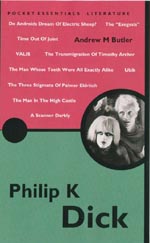
"Swift as a shadow, short as any dream;It would be quick and convenient to characterize Andrew M. Butler's new book about Philip K. Dick as yet another example of our culture's precipitous dumbing-down rush to a quick and convenient lifestyle, albeit microwave "cooking", 15 minutes of fame, sound bites, email, more and more "stuff" available at drive up windows, or the ubiquitous pamphlet style publications at supermarket checkout counters.
Brief as the lightning in the collied night,
That in a spleen unfolds both heaven and earth,
And ere a man hath power to say, "Behold!"
The jaws of darkness do devour it up:
So quick bright things come to confusion."W. Shakespeare
A Midsummer Night's Dream, Act i, Sc. iBut Philip K. Dick is far from being a quick and convenient writer, no matter how assiduously various academics try to make him into a postmodernist or gnostic poster child. His philosophical ideas and themes continue to resist such acidic exegesis, in particular his use of pre-socratic philosophy, German Romanticism, and Jungian psychology.
And Andrew M. Butler, in fact, wrote his PhD dissertation on PKD, titled: Ontology and Ethics in the Writings of Philip K. Dick (Univ. of Hull, 1996). In that our quick and convenient society values credentials more than ability -- quicker and more convenient to visually take in the number of esoteric initials after a person's name than to cogently evaluate their actual intellectual accomplishments and abilities -- we should at least read Professor Butler's 96 page book while waiting in line at the next drive up window we visit, observing on the back cover that he lectures in Film and Media Studies at BCUC (Buckinghamshire Chilterns University College, High Wycombe), is the joint features editor of Vector, and membership secretary of the Science Fiction Foundation.
That noted, The Pocket Essential Philip K. Dick is reminiscent of the Fodor or Michelin $10 a day travel guides wherein incisively written highlights and summaries are given of what to do and see. In this instance Andrew has schematized Dick's life and writing career into four primary periods: Learning The Ropes 1941-1953, A Double Life 1954-1960, At The Peak 1961-1969, and Over The Edge? 1970-1982. Within this he gives a plot summary for and discusses the major themes, points of interest or achievements of each PKD novel, as well as conveniently rating them from 1-5; only 8 PKD novels get a 5 rating. Andrew also does an admirable job in tracing recurring characters, settings, and themes, along with noting parallels between PKD's novels and autobiography. And there is a concluding chapter on "Reference Materials" along with an introductory essay "Beyond The Veil".
It's in this essay we can glean Andrew's controlling focus from the salient sentence: "Philip K. Dick is the Poet Laureate of false memories and fake experiences", false and fake being quick and convenient labels that could equally apply to much of our culture. This is a very important point, often overlooked by those PKD commentators who zealously promote only Phil's so called "pink beam" experiences, or Exegesis, and/or Valis trilogy. Far more significant, and relevant, is the Zeitgeist Phil experienced in and near Berkeley, California (mid 1940s-1960s), in particular the aftermath of WWII, the Cold War, McCarthyism, and Totalitarianism. It was the falseness and fakeness of our culture's perceptions of, and reactions to, these that PKD more consistently explored and explicated in his stories and novels.
This is, admittedly, an unpopular view currently. Andrew notes a contentious dichotomy between PKD biographers, critics and academics, in that one faction finds "Dick's mystical side as a Fortean phenomenon" while the other dismisses "it as evidence for his insanity". He posits a third alternative: "whatever happened was crucial to his career, but it was not the first time Dick had confronted religion, in his work or his life, nor did Dick always accept the events uncritically".
I would argue a fourth possibility, that enough evidence exists in Phil's letters, interviews and essays to indicate he used "religion" as but another "tool" in his eclectic "intellectual tool box" to help him answer the, for him, very important questions: What is Reality?, and What is human-ness?, in particular as they helped to explain what kind of human and what kind of reality could allow the Zeitgeist he experienced.
It's unfortunate, therefore, that Andrew didn't have much opportunity, in 96 pages, to expand upon his apt observation of PKD as an epistemological Poet Laureat. In fact, there isn't even a photo of Phil in the book. The only photographic image is a small one on the front cover showing Batty and Pris from the movie Blade Runner. Nonetheless, this book is a quick and bright way to introduce Philip K. Dick to a wider audience. As Andrew states in a recent interview:
"There's clearly already a good deal of interest in Dick
through Blade Runner, and I'm hoping I can encourage
people to read a few more books. So anyone with a
taste for sf, fan and non-fan alike, students who are
forced by nasty lecturers like me to read sf, people with
an interest in visionary writing, and so on."
I would add it will help you diffuse the unnecessary mystical darkness and confusion permeating a lot of contemporary PKD commentary. And it will fit in your pocket, which is definitely quick and convenient. (FCB, 4/01)